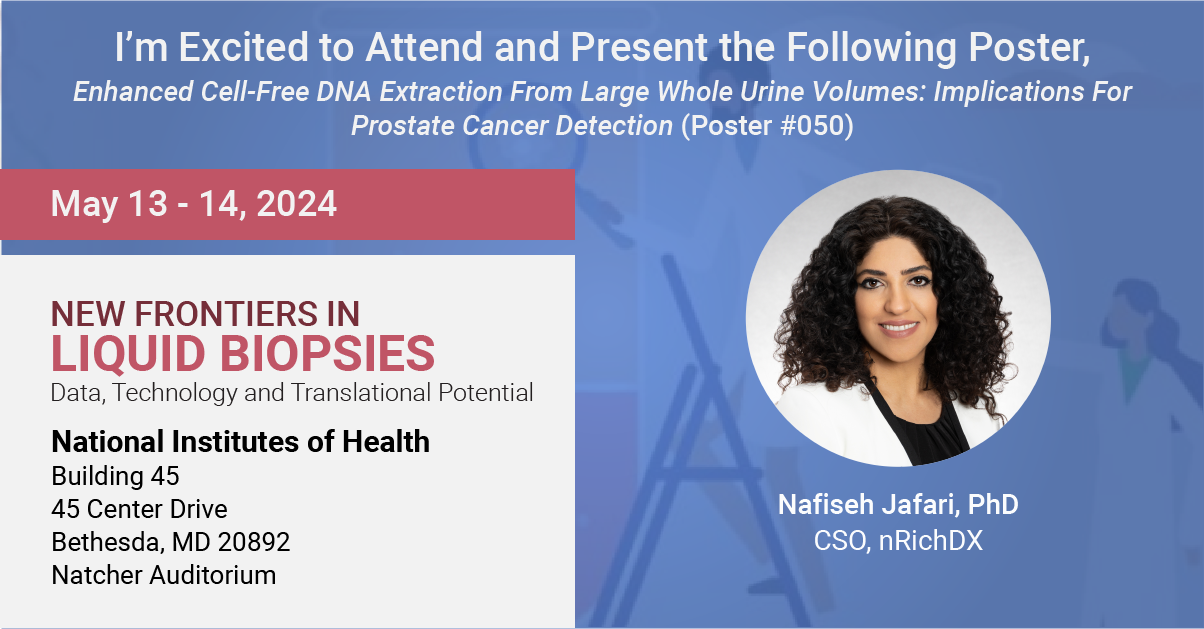New Frontiers in Liquid Biopsy Meeting - Data, Technology and Translational Potential
More information is available on the meeting website here:
nRichDX Poster Info
Meet with Us
If you plan to attend the meeting, or you're in the D.C. Metro Area, and would like to meet in Bethesda on May 13 or 14, 2024, Please complete the short form below:
POSTER#050 ABSTRACT - All poster abstracts for the meeting are available here.
ENHANCED CELL-FREE DNA EXTRACTION FROM LARGE WHOLE URINE VOLUMES: IMPLICATIONS FOR PROSTATE CANCER DETECTION
JAFARI N, SAENZ J, LEE L, HERNANDEZ C, DUNNIGAN A, and SAIDIAN M nRichDX, Irvine, California, USA
Introduction: Urine, as a non-invasive source of genomic materials, offers a promising avenue for prostate cancer detection. However, the extraction of cfDNA from urine is challenged by its low concentration, necessitating the development of more efficient extraction methods. This study aimed to enhance DNA extraction from large whole urine volumes, thereby improving the sensitivity and reliability of prostate cancer detection. This enhanced extraction method eliminates the analyte yield-lowering steps often used by other extraction methods – schemes like pre-extraction volume concentration, splitting samples into separate extractions, sample transfers between plasticware, and eluate pooling. These schemes lower rare analyte yields; thus, liquid biopsy applications require better sample prep methods.
Methods: This study collected fifty-milliliter whole urine samples from 12 healthy donors. After collection, the samples were preserved with nRichDX whole urine preservative. Total (cellular and cell-free) spiked with LANCAP cells containing the PTEN mutation—a genetic alteration commonly associated with prostate cancer. The nRichDX Revolution Max20 cfDNA Isolation Kit was employed to extract DNA from the samples. The replicate samples were also extracted with the Zymo Quick-DNA Urine Kit. The actionable recovery of DNA molecules was determined by quantitative real-time polymerase chain reaction (qPCR) mutation detection assay using TaqMan.
Results: Quantitative assessments revealed a notable increase in DNA concentration, surpassing the yields obtained through standard extraction methods by a significant margin for the nRichDX Revolution Max20 cfDNA Isolation Kit. The yield was consistent across all the samples. The actionable DNA molecules were statistically significantly higher than those recovered using the Zymo Quick-DNA Urine Kit, as evidenced by Ct values calculated on qPCR mutation detection.
Conclusion: The study's findings underscore the efficacy of the enhanced DNA extraction protocol using the nRichDX Revolution Isolation Kit in processing large urine volumes. This kit is designed to process larger volumes of up to 50 mL in a single extraction step, thus potentially recovering higher yields and quality of DNA compared to other kits, which typically require the splitting and pooling of samples, leading to lower yields and possibly compromised DNA integrity. This advancement holds significant promise for the non-invasive detection of prostate cancer, enabling a more sensitive and reliable diagnostic approach. By improving the yield and quality of DNA extracted from urine, this method paves the way for the broader application of liquid biopsy techniques in prostate cancer management, potentially facilitating earlier detection and more effective disease monitoring.


